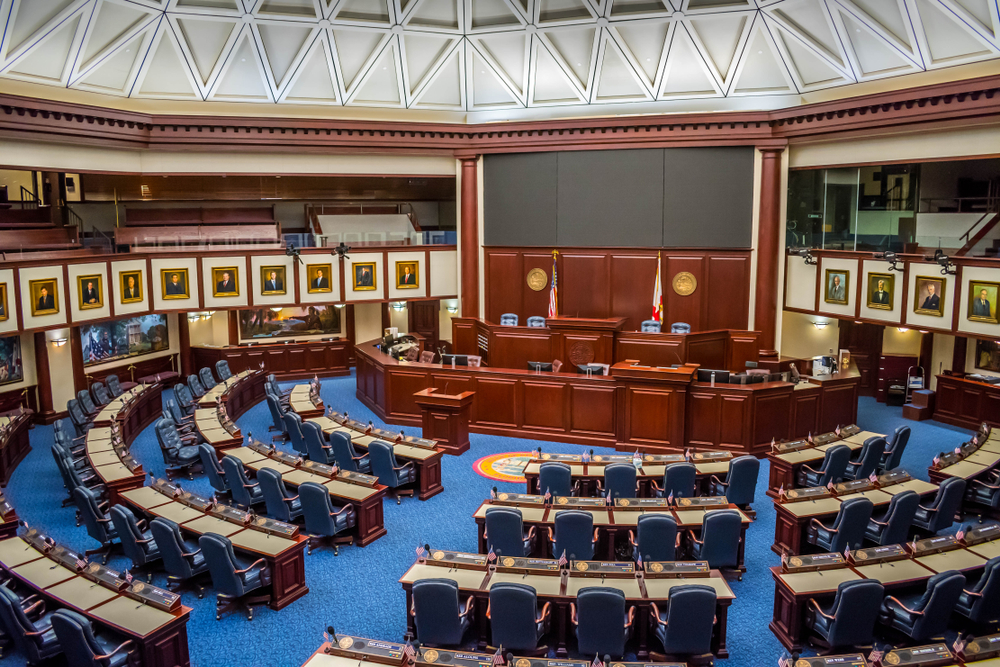![]() Florida’s prison system is the third largest in the nation with approximately 95,000 inmates and nearly 164,000 offenders on probation. It’s clear that Florida does a tremendous job of incarceration but we have neglected rehabilitation for far too long. The one question we must ask ourselves when considering how to make long-term improvements to our criminal justice system is, “Are we fostering an environment for Floridians to leave prison better than when they entered?”
Florida’s prison system is the third largest in the nation with approximately 95,000 inmates and nearly 164,000 offenders on probation. It’s clear that Florida does a tremendous job of incarceration but we have neglected rehabilitation for far too long. The one question we must ask ourselves when considering how to make long-term improvements to our criminal justice system is, “Are we fostering an environment for Floridians to leave prison better than when they entered?”

Keith Perry
Approximately 86% of Florida’s inmates will return to society and be expected to immediately resume making meaningful contributions to our communities. It’s critical that we ensure our correctional facilities are equipped with the resources inmates need to be successful upon release, rather than being treated as mere warehousing facilities. The likelihood of recidivating is directly correlated to whether or not inmates have access to education, workforce development and reentry programs.
To reform the system, we must break this cycle. As chair of the state Senate Committee on Criminal Justice, I’m dedicated to fighting for the practical, common-sense changes that Florida’s taxpayers and families deserve. While the purpose of prison is to provide appropriate punishment, it also serves as a much-needed opportunity to get our citizens back on the right track.
Getting to the root of successful reform means analyzing Florida’s perpetual budget crisis resulting from funding shortfalls. Florida’s Department of Corrections Secretary Mark Inch recently appealed to the legislature, stating “the status quo is not sustainable.”
As evidenced in his presentation, the reality of our fractured system is alarming. Extending correctional officers’ shifts from eight to 12 hours in the name of pinching pennies has created a dangerous domino effect of high staff turnover rates, increase in violence and low wages. How can we realistically expect our inmates to improve while the culture and environment around them is deteriorating?
Since 2009, the correctional officer turnover rate has increased by nearly 150%. As in any profession, higher staffing turnover rates significantly depletes institutional knowledge, talent and experience. Not only has this resulted in higher volumes of inmate on inmate assault, inmate on officer assault and contraband incidents, it has also put taxpayers on the hook for increased cost of correctional overtime pay. Last year I championed a bill to open the correctional officer employment pool to include 18-year-old applicants in an effort to alleviate the staffing crisis, but that was only one piece of the puzzle.
More reforms to come
The Florida legislature must be brave enough to fully fund our correctional facilities if we truly want to see holistic improvements throughout our state. Thankfully, Gov. Ron DeSantis has proposed a bold budget increase for 2020 to reduce officers’ shifts and incrementally increase salaries.
Last year, Florida made initial strides toward meaningful criminal justice reform with the Florida First Step Act. Modeled after President Donald Trump’s federal First Step Act, Florida’s criminal justice package implemented proven strategies to hold offenders accountable while diverting low-risk offenders to more cost-effective sanctions. By increasing the outdated felony theft threshold of $300 to $750, which had not been updated since the 1980s, the punishment will more appropriately fit the crime and be less of a burden on taxpayers.
By reducing the number of offenses that result in a suspended drivers’ license, we removed some of the barriers that prevent past offenders from finding jobs and contributing to our communities once again. These common-sense measures are indeed only the first step in transformative reform and will serve as the foundation of our future efforts.
One of my top priorities for this upcoming session is to ensure that juvenile offenders have a chance to learn from their missteps and earn a clean record. Minors who are arrested for misdemeanors may petition the court to expunge their record once they complete a diversionary program. SB 700 Juvenile Justice Diversion Program Expunction expands this program to also include minors who commit felonies. Florida’s children who want to put in the work to right their wrongs should have the chance at a better future and to eventually enter our workforce without the stigma of a criminal record.
I’m honored to work alongside my friends in the legislature who are just as dedicated to championing innovative solutions. One of the main focuses for continued criminal justice reform is diverting nonviolent, low-level offenders away from state prisons and into diversionary or supervised programs.
Two important measures we have passed through my criminal justice committee are SB 346 Criminal Justice and SB 554 Sentencing. Both bills give judges more discretion at sentencing and increases their ability to divert from mandatory minimums. Floridians who need to be in treatment for substance abuse, addiction or mental health should be able to seek the help they need instead of being incarcerated at the expense of hardworking taxpayers.
The average person makes hundreds of decisions each day, beginning with what to have for breakfast and ending with what time to go to sleep, but the opportunity for physical and mental choices deteriorates greatly while in prison. Currently Florida’s inmates must serve at least 85% of their sentence. Inmates have the opportunity to earn 10 days off their sentence per month by accumulating “gain time” through participating in educational and training programs, and the decision to do so is completely up to them.
The real world does not reward people for merely behaving in a civilized manner — it rewards us for achieving various levels of education, completing certificate courses or doing more than what is expected of us. Empowering inmates with the decision to better themselves will cultivate the work ethic and persistence that employers seek, while decreasing the likelihood of recidivism.
Our crime drop isn’t special
For the 48th consecutive year, Florida has seen a drop in overall crime rate. This is a success that many lawmakers can take pride in and feel that it is a reflection of safer streets and sound policy.
However, taking a deeper look into what this statistic stands for can give us better context. For example, Maine requires nonviolent offenders to serve 71-81% of their sentence; Minnesota requires nonviolent offenders to serve 67% of their sentence; and Washington requires nonviolent offenders to serve half their sentence. Each of these states has a lower crime rate than Florida.
Enhancing earned gain time would be a major reform not only from a moral standpoint, but a fiscally responsible one. Last year, state estimators calculated that a very similar measure would save the state approximately $860 million. These funds could be put back into educational and vocational programs for our inmates, or back into taxpayers’ pockets.
Criminal justice reform requires a multifaceted approach to balance the scales between public safety, rehabilitation and fiscal responsibility. As the evidence states, our current criminal justice model is heading in the right direction, but there are numerous opportunities for us to improve our system even more. By partnering with leaders like the governor and secretary Inch, I’ve never been more hopeful that together we are creating a domino effect of substantial criminal justice reform that will have positive impacts for years to come.
Republican state Sen. Keith Perry represents Florida’s 8th Senate District, which includes Alachua and Putnam counties, and part of Marion County. As chairman of the Senate Committee on Criminal Justice, he has spent his legislative career championing meaningful criminal justice reform for Floridians.

Dear Senator,
Thanks for working to reform our terrible criminal laws and sentences in Florida. Our laws for non-violent and drug offenses are Draconian. Our prison system is widely considered the worst in the nation. Sadly there are few advocates for our incarcerated population. Please keep pushing for reforms. If some of the assholes in the legislature would actually visit prisoners they might realize that they are humans and should not be housed in prisons worse than any in the civilized world, then stuck with tens to hundreds of thousands of fines to pay after they have served their time. It is shameful and gives them no chance in life.
Sincerely,
Dave Coile
My son is a Colorado State Prisoner being held at Coleman 1 Federal facility. I am trying to get him back to Colorado. His dad and I cannot travel. We can’t get any answers except: you have to deal with Colorado and Colorado which tells us….nothing.
Who can help us, please